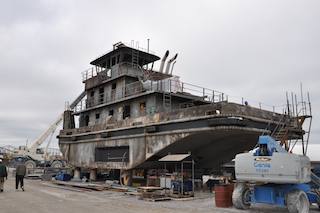Yesterday, Conrad Industries Inc. announced its fourth quarter and 2014 results and that its backlog had risen over $27 million versus Dec. 31, 2013.
For the quarter ended Dec. 31, 2014, Morgan City, La.-based Conrad had net income of $5.2 million and earnings per diluted share of 88 cents compared to net income of $10.1 million and earnings per diluted share of $1.70 during the fourth quarter of 2013. The company had net income of $22.8 million and earnings per diluted share of $3.84 for the 12 months ended Dec. 31, 2014 compared to net income of $28.6 million and earnings per diluted share of $4.80 for the 12 months ended December 31, 2013. Conrad’s backlog was $180.2 million on Dec. 31, 2014, compared to $152.9 million a year earlier.
“While our net income was lower in 2014 compared 2013, we achieved the highest gross profit in our company’s history in the vessel construction segment," Johnny Conrad, president and CEO, said in a statement. "The decline in earnings was attributable to our repair and conversion segment, in which gross profit decreased $11.8 million or 65.6%, compared to 2013. This decrease was primarily due to a significant loss on a large conversion job, and a decrease in demand and customer activity, which we believe is due to the decline in crude oil prices." In the second half 2013, Conrad had a large job which added significantly to the shipyard's repair and conversion gross profit.
As of Dec. 31, 2014, Conrad had cash of $68.6 million and no long-term debt. During the past five years, Conrad has made approximately $44.8 million of capital expenditures to add capacity and improve the efficiency of the company's shipyards. For 2015, Conrad's board has approved a $27.3 million capital expenditure program, which includes $16.7 million for the continued development of the Conrad Deepwater South yard. The additional improvements at Deepwater South will continue to enhance Conrad's ability to build larger vessels.
“Throughout the years, we have used our cash generated from operations to make investments in our business to continue to diversify our product mix, take advantage of business opportunities and improve efficiencies," Conrad said. "We believe these investments have allowed us to remain competitive, meet changing customer needs and navigate effectively through business cycles. Additionally, we have returned cash to our shareholders through our stock repurchase program and special dividends in each of the past three years, and in 2015, we initiated a quarterly dividend.”
Conrad added that the company has been actively pursuing increased opportunities to produce different types of vessels for new markets, and is encouraged by its recent contract award to build an LNG bunker barge. Some of the vessels, including the LNG bunker barge, are larger, take longer to start production, and take longer to complete than vessels built at Conrad in the past.
But not all is rosy at Conrad. The company noted that it has seen a decline in demand for inland tank barges primarily used to transport petroleum products produced from shale plays, delays on orders for larger projects, and a soft repair market. Conrad believes all are tied to the decline in crude oil prices. Conrad expects these factors to negatively impact its financial performance during 2015, compared to 2014.
Conrad designs, builds and overhauls tugs, ferries, liftboats, barges, offshore supply vessels and other steel and aluminum products for both the commercial and government markets. The company provides both repair and new construction services at its five shipyards located in southern Louisiana and Texas.





